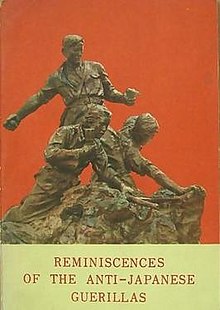Reminiscences of the Anti-Japanese Guerillas
| Korean name | |
|---|---|
| Chosŏn'gŭl | 항일 빨찌산 참가자들 의 회상기 |
| McCune–Reischauer | Hangil ppaltchisan ch'amgajadŭl ŭi hoesanggi |

Cover page of the English edition (1968)
|
|
| Country | North Korea |
| Language | Korean |
| Subject |
|
| Genre | Memoirs |
| Published |
|
| Publisher |
Pyongyang: Workers' Party of Korea Publishing House (Korean ed.) Pyongyang: Foreign Languages Publishing House (English ed.) |
| Media type | Print in multiple volumes |
| Pages | 227 p.; vol. 1 (Korean ed.) 153 p. (English ed.) |
| Awards | People's Prize (2012) |
| OCLC | 1097890 |
| 951.9/03 | |
| LC Class | DS917 .R397 |
Reminiscences of the Anti-Japanese Guerillas is a collection of memoirs of North Korean guerillas fighting during the 1930s and 1940s in Manchuria against the Japanese. It was used as a textbook for indoctrination until it was effectively replaced by another piece of guerilla literature, Kim Il-sung's autobiography With the Century, in the 1990s. The memoirs were written in order to portray Kim Il-sung as a national liberator, and to strengthen his cult of personality. However, the memoirs are still used as a textbook in ideological workplace study sessions, as well as in other forms of indoctrination. Many of the memoirs have been adapted as movies by the North Korean film industry.
The Party History Institute was founded in 1958, and its collection of memoirs, Reminiscences of the Anti-Japanese Guerillas, was published in 1959, when Kim Il-sung's cult of personality was being strengthened after the August Faction Incident. These initiatives were part of the efforts to create and promote Kim Il-sung's activities during World War II as an anti-Japanese myth. High-ranking defector Hwang Jang-yop dated the beginning of the personality cult at the end of the 1960s, when various guerillas disappeared from North Korean partisan literature. Until the 1960s, guerillas like Eul Ji Mun Deok, Kang Gam-chan and Lee Sun-shin were common in North Korean partisan literature. Others like Ahn Chang-ho and Shin Chae-ho were discredited.
...
Wikipedia
